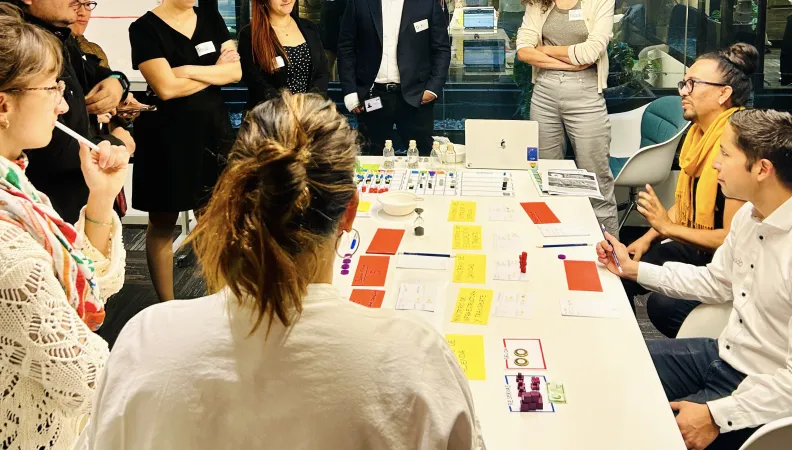Share the page
Powershift Strategy Game: Supporting multi-stakeholder dialogue on Colombia’s climate action plan

-
Project start date
-
2024Status
Completed
-
Project end date
-
2025
-
AFD financing amount
-
171 245
-
Country and region
-
Location
-
Colombia
-
Partners
-
Research program
How can we better understand the behavior of the various stakeholders involved in Colombia's low-carbon transition? This project seeks to facilitate and promote high-level strategic dialogue around Colombia's energy transition through the design of a participatory process and the development of an interactive tool. Specifically, it aims to enable the exploration of different scenarios and support informed decision-making.
Context
Colombia, a country heavily reliant on fossil fuel exports, is actively working to complete its low-carbon transition and achieve its Nationally Determined Contribution (NDC) targets under the Paris Climate Agreement.
To support these efforts, Agence Française de Développement (AFD) has partnered with Colombian authorities to adapt the GEMMES macroeconomic model to Colombia's specific context. The objective was to assess the long-term macroeconomic vulnerabilities and opportunities linked to Colombia's energy transition within the broader global shift to low-carbon economies.
This research work has culminated in a collaborative publication, which outlines the scientific findings and public policy recommendations derived from the GEMMES Colombia project: Modelling low-carbon transitions in Colombia: Macrofinancial risks and opportunities
While macroeconomic modelling is crucial for understanding the impacts of policy decisions and addressing macroeconomic imbalances during transitions, it is equally important to consider the behavioral aspects that shape the decision-making processes and strategies of stakeholders involved in Colombia’s low-carbon transition.
About GEMMES: AFD and Macroeconomic Modelling Tools for the Ecological Transition
Goal
Building on the empirical findings from the GEMMES model scenarios, this project focuses on developing a strategy game to collectively explore future scenarios. Beyond the economic and financial dimensions, this tool also incorporates social, climatic, and—albeit to a lesser extent—biodiversity-related aspects, providing a more holistic approach to the energy transition.
The primary objective of this participatory modelling process is to foster dialogue among the key stakeholders in Colombia's transition, including ministries, the central bank, entrepreneurs, and researchers. By doing so, it aims to help them anticipate and prepare for the short-, medium-, and long-term macroeconomic impacts that the low-carbon transition may bring.
To achieve this, the Powershift strategy game aims to:
- Familiarize stakeholders involved in the transition with the macroeconomic challenges associated with it, enabling them to take ownership of these issues.
- Identify the "mental maps" of each category of stakeholder regarding the energy transition, thereby shedding light on the tensions and synergies that arise and supporting the evolution of these mental models.
In doing so, the project seeks to strengthen high-level interministerial and intersectoral dialogue, ultimately improving coordination among stakeholders—including the private sector—in support of Colombia's environmental commitments.
Download the project presentation leaflet (in Spanish)
Method
The design, modeling, and implementation of the strategy game are grounded in the ComMod methodology, initially developed by CIRAD to facilitate multi-stakeholder processes and support collective decision-making and action.
The process includes modelling workshops with stakeholders, crash-test sessions, and game workshops with decision-makers. Key stages involve conceptualization, validation, and scenario exploration. An ex-ante and ex-post evaluation of stakeholder positions will be conducted to measure the impact of the initiative.
To ensure the effective integration of findings into public policies, feedback workshops will be organized with policymakers.
Results
The project has led to the creation of a validated strategy game, which is now being used by Colombian counterparts to explore energy transition scenarios. To date, six crash-test and game sessions have been conducted, engaging around fifty public and private stakeholders in the energy transition and involving more than twenty institutions. These include Colombian universities, ministries (Finance, Environment, Labour, Planning), the central bank, research centers, international cooperation agencies, NGOs, business associations, and consultancies.
Future outputs will include workshop summary reports, a research paper, policy recommendations, and mediation materials. The lessons learned will be shared with Colombian partners through dedicated feedback workshops.
Find out more:
Lessons learned
Feedback from participants in the sessions highlights an improved understanding of the effects of the energy transition on the real economy of a country heavily reliant on hydrocarbon exports, as well as increased awareness of the associated challenges.
The main feedback points were as follows:
- Creation of an educational space conducive to dialogue: The sessions fostered connections with stakeholders who had not previously been in contact, facilitating new opportunities for collaboration.
- Flexibility and adaptability: The tool proved its ability to adapt to diverse audiences, making it a valuable resource for engaging a wide range of participants.
- Awareness of complex dynamics: Participants gained deeper insight into the intricate dynamics of the energy transition and the crucial role of research in this field.
- Highlighting behavioral dynamics: The sessions revealed that organized collective action often arises in response to emergencies or shared challenges.
- Challenge of a holistic vision: Developing a comprehensive understanding of the energy transition and stakeholder strategies was noted as particularly difficult due to the subject's complexity.
Future sessions will expand to include parliamentarians and deputy ministers, broadening the dialogue to higher levels of decision-making.
Contacts
- Annabelle Moreau Santos, Scientific Mediation Officer, AFD
- Antoine Godin, Economist, Head of AFD Macroeconomic Modelling Team
- Audrey Perraud, Research Officer, AFD
- Julien Calas, Agronomist and Research Officer on Biodiversity, AFD



